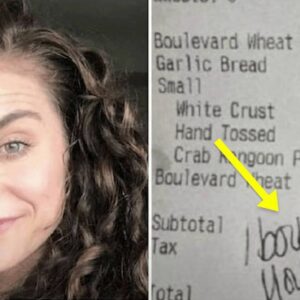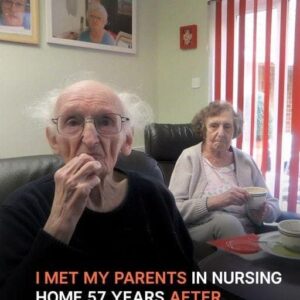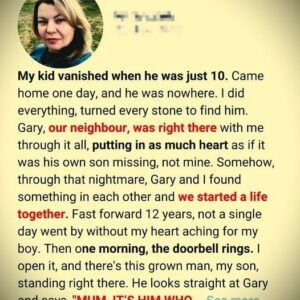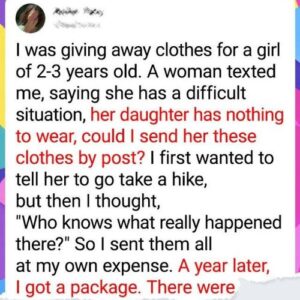After discovering she couldn’t conceive, Annie’s doctor presented her with another option: adoption. This led her to Abiona, a girl who initially didn’t speak English. When Abiona finally learned enough of the language, she shared a secret that altered Annie’s life forever.
Annie sat nervously in Dr. Martinez’s office, surrounded by posters of happy families. The doctor, a middle-aged woman with a warm presence, invited her to take a seat.
Annie, hopeful, asked, “When can we start the fertilization process?”
Dr. Martinez sighed before revealing, “The tests show you cannot have children. I’m truly sorry.”
Though IVF was a possibility, the doctor discouraged it due to the low chances of success and the risks involved. Instead, she suggested adoption and handed Annie a brochure filled with details about children needing homes.
Sitting at her kitchen table, Annie leafed through the adoption booklet in the quiet of her home. One photo of a baby with an innocent, smiling face caught her attention.
With shaky hands, she called the adoption agency and scheduled a meeting. Days later, she was greeted by Caitlin, a social worker, in her small office. “Sorry for the wait,” Caitlin said, shaking her head.
Annie, hiding her nerves, replied, “It’s okay.”
They discussed Annie’s work, her home life, and her desire to adopt. Caitlin asked, “Are you prepared to dedicate enough time to a child? It’s not just a part-time commitment.”
Annie answered confidently, “Yes, I’m ready to make the necessary sacrifices.”
Though Caitlin warned about the challenges of adoption, she ultimately approved Annie’s application.
“Thank you,” Annie responded firmly.
The next morning, Caitlin called Annie during breakfast.
“We’ve found a child for you,” Caitlin said, introducing Abiona, a six-year-old girl from Congo who didn’t speak English. “Would you like to meet her today?”
“A six-year-old? And she doesn’t speak English?” Annie hesitated.
“Take your time to think it over,” Caitlin replied, though Annie could hear her sigh before the call ended.
Annie spent the day weighing her decision. Starting motherhood with an older child felt strange, but this might be her only chance. The next day, she called Caitlin back with a firm yes, and a meeting with Abiona was arranged.
At the foster home, Annie nervously knocked on the door and was met by a rather unfriendly woman. After a curt greeting, the woman pointed to a quiet corner where Abiona was drawing.
“That’s her,” the woman said dismissively. “Good luck. She doesn’t talk to anyone.”
Annie knelt beside the girl, who briefly met her eyes before returning to her drawing. “Did you draw these? They’re impressive,” Annie said softly.
Abiona gave a small nod without speaking. The foster mother interjected, “She doesn’t understand English.”
Unbothered, Annie focused on the girl, sitting beside her and starting to draw. She sketched a house and a stick figure, saying, “This is my house. Do you want to live with me?”
The girl stared at the picture and then at Annie before drawing a smaller figure next to hers, making Annie’s heart flutter.
Annie brought Abiona home, showing her the new bedroom she had prepared. The girl remained quiet, exploring the room before eagerly starting to draw again. Annie watched in awe, feeling like she was finally a mother.
Over the next few months, Annie tried teaching Abiona English, but traditional methods overwhelmed the girl. She switched to using drawing sessions to teach language, which Abiona responded to positively.
One day, while explaining the idea of family, Annie pointed to an illustration in a book, saying, “This is a family. I’m your mom, and you’re my daughter.”
Instead of agreeing, Abiona burst into tears.
“What’s wrong?” Annie asked, gently stroking her hair.
Through broken English, Abiona revealed her painful truth. “Bad men took me from my Mom and Dad.”
Annie’s heart sank. Caitlin had never mentioned Abiona’s family. “What do you mean?” she asked softly.
Abiona explained that she was taken by bad men and later placed with the police. The only memory she had of her mother was a handmade toy her mother had given her. “Mom smells like honey,” she added tearfully.
Annie hugged Abiona tightly, their bond deepening through the girl’s heart-wrenching confession.
Months later, Abiona developed a severe cough during the night. Annie rushed her to the hospital, where doctors stabilized her but delivered devastating news: Abiona had a terminal genetic disease and only a few days to live.
Annie was shattered. “What? How is this possible? She seemed healthy.”
The doctor explained it was a rare condition, one that couldn’t have been predicted. Annie was left heartbroken, helpless as her daughter’s condition deteriorated.
When Abiona woke, she made one request in her weak voice: “I want to see my mom.”
Determined to grant this wish, Annie took Abiona’s handmade toy to the police, who miraculously matched it to her biological mother, Tendey. Despite Annie’s attempts to contact her, Tendey refused to see her daughter, even when Annie visited her in person.
Heartbroken, Annie came up with a plan. She hired an actress, Sarah, to pose as Tendey, knowing how much Abiona wanted to see her mother.
The next day, Sarah, wearing honey-scented perfume, visited the hospital. Annie introduced her as Abiona’s mother, and the girl, weakened by her illness, believed it instantly.
“You smell like Mom,” Abiona whispered, embracing Sarah. “Thank you,” she told Annie before drifting back to sleep.
Later that night, with Abiona in her arms, Annie watched over her daughter as her breathing slowed. Abiona murmured “Mom” one last time before passing away peacefully.
Tears streaming down her face, Annie whispered, “You were loved. So loved. And I will keep loving you forever.”





